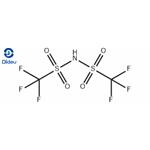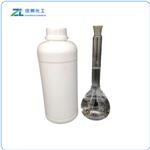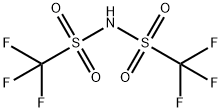Trifluoromethanesulfonimide: Proton Exchange Membranes and Allylsilane Annulations
Trifluoromethanesulfonimide is a promising Bronsted acid catalyst and is superior to scandium triflate in catalytic action. Trifluoromethanesulfonimide may be used as a catalyst for the preparation of 1-substituted-1H-1,2,3,4-tetrazoles.

Trifluoromethanesulfonimide-based hygroscopic semi-interpenetrating polymer network
Proton exchange membrane fuel cells (PEMFCs) are one of the most promising energy conversion devices owing to their advantageous features such as high efficiency, eco-friendliness, and rapid startup. As the core component of PEMFCs, proton exchange membranes (PEMs) act as both a proton conductor and a fuel/oxidizer separator. Trifluoromethanesulfonimide (triflimidic acid, HNTf2, CF3SO2–N–H+-SO2CF3) is a crystalline solid with incredible hygroscopicity, which can easily deliquesce into an aqueous solution by capturing moisture when exposed to air. In addition, HNTf2 is one of the strongest acids (even stronger than trifluoromethanesulfonic acid, CF3SO2OH). Incorporation of the super acid HNTf2 into a PEM could significantly increase proton concentrations in the ionic channels and optimize the chemical environment to further enhance proton conduction. Thus, the incorporation of Trifluoromethanesulfonimideis expected to improve the performance of PEMs significantly at low humidity. However, to avoid undesirable leakage from PEMs, HNTf2 should be immobilized on an insoluble support. Although numerous materials have been exploited as supports for immobilization of hygroscopic groups, incorporation of these supports (proton-insulated bulk materials) tends to render tortuous ionic channels as well as decrease the available space for proton conduction.[1]
Herein, to realize PEMs with improved proton conductivity, we designed a hygroscopic monomer by linking Trifluoromethanesulfonimide with propyl methacrylate to form 1-[3-(methacryloyloxy)propylsulfonyl]-1-(trifluoromethanesulfonyl)imide (MPTI). To quantify the hygroscopicity of MPTI, the interaction energy between water and MPTI was calculated using a molecular dynamics simulation (MDS). SIPNs were fabricated by blending Nafion and polymeric MPTI. Nafion was employed as the linear polymer because it is a state-of-the-art polyelectrolyte for PEMs. The performance of the obtained composites as PEMs was thoroughly investigated, especially in regards to water uptake and proton conductivity at low humidity.
Trifluoromethanesulfonimide-catalyzed allylsilane annulations of benzylic alcohols
Fragment coupling reactions that assemble complex products convergently from two or more reaction partners are exceptionally useful in synthesis. This utility is amplified greatly when new stereochemical elements and rings are formed as a consequence of the reaction, allowing the synthesis practitioner to transform simple starting materials into complex cyclic or polycyclic products directly. Within this context, allylsilane reagents have received significant attention due to their capacity to participate in a wide range of complexity-generating annulations leading to the development of efficient methods for the concise synthesis of numerous chemical architectures, including heterocycles and carbocycles. The development of a Trifluoromethanesulfonimide-catalyzed annulation of benzylic alcohols with allylsilanes for the synthesis of indane or tetralin structures is reported. In this fragment coupling reaction, complexity is built rapidly from readily available starting materials to yield diverse sets of products with up to three contiguous stereocenters. Indanes or tetralins can be generated from common precursors depending on the structure of the allylsilane reagent used. The concise synthesis of several lignan natural products highlights the utility of this newly devised methodology.[2]
We initiated our investigations using methallylsilane, a commercially available type A silane, and quickly identified bis(trifluoromethanesulfonyl)imide (triflimide) as the best catalyst, with nitromethane as the optimal solvent (see ESI for more details). Using 10 mol% of Trifluoromethanesulfonimide, the reaction proceeded over the course of two hours at room temperature and proved tolerant to a range of benzylic alcohol precursors, thus delivering a diverse set of indane products in good to excellent yields. Utilizing the symmetrical benzhydryl alcohol as a common precursor we next demonstrated the capacity of type B and C allylsilanes to undergo the desired Trifluoromethanesulfonimide-catalyzed annulation processes. In summary, we have developed a Brønsted acid-catalyzed annulation for the divergent synthesis of substituted indanes and tetralins from a set of common precursors. The strategic ability to rapidly build complexity from commercially available or easily prepared starting materials makes this methodology amenable to the concise preparation of various chemotypes, including bioactive natural products. Future work will focus on the development of enantioselective variants of these reactions using chiral strong Brønsted acids, which is an exciting prospect given the recent advancements in that field.
References
[1]Sun, S., Ling, L., Xiong, Y., Zhang, Y., & Li, Z. (2020). Trifluoromethanesulfonimide-based hygroscopic semi-interpenetrating polymer network for enhanced proton conductivity of nafion-based proton exchange membranes at low humidity. Journal of Membrane Science, 612, 118339. https://doi.org/10.1016/j.memsci.2020.118339
[2]Reddel JCT, Wang W, Koukounas K, Thomson RJ. Triflimide-catalyzed allylsilane annulations of benzylic alcohols for the divergent synthesis of indanes and tetralins. Chem Sci. 2017 Mar 1;8(3):2156-2160. doi: 10.1039/c6sc04762a. Epub 2016 Dec 9. PMID: 28507668; PMCID: PMC5407261.
You may like
Lastest Price from Trifluoromethanesulfonimide manufacturers

US $0.00-0.00/KG2025-12-05
- CAS:
- 82113-65-3
- Min. Order:
- 1KG
- Purity:
- 98
- Supply Ability:
- 10000KGS

US $10.00/kg2025-04-21
- CAS:
- 82113-65-3
- Min. Order:
- 1kg
- Purity:
- 99%
- Supply Ability:
- 20 ton


